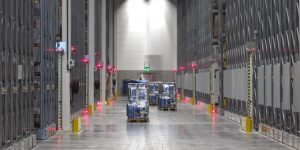Requirements for a Cold Storage Warehouse
A cold storage warehouse is a specialized facility designed to store goods and products that require specific temperature and humidity conditions to maintain their quality and freshness. These warehouses play a crucial role in various industries such as food and beverage, pharmaceuticals, and agriculture. To ensure the proper functioning and effectiveness of a cold storage warehouse, certain requirements need to be met. In this article, we will explore the key requirements for a cold storage warehouse.
1. Temperature Control
Temperature control is the most critical requirement for a cold storage warehouse. The facility must have the capability to maintain the desired temperature range consistently. Different products have specific temperature requirements, and the warehouse should be able to accommodate various temperature zones to store different items.
Modern cold storage warehouses utilize advanced refrigeration systems to regulate and monitor temperature levels accurately. These systems often employ a combination of cooling units, insulation, and automated temperature control systems to maintain the desired environment.
Insulation
The insulation of the warehouse plays a vital role in preventing heat transfer and maintaining the desired temperature. High-quality insulation materials, such as foam panels or spray foam insulation, are commonly used. The walls, roof, and flooring should be properly insulated to minimize temperature fluctuations and prevent external heat infiltration.
Refrigeration System
The refrigeration system is the heart of a cold storage warehouse. It should be designed to handle the cooling load efficiently and maintain a consistent temperature. The system may include compressors, evaporators, condensers, and other components, all working together to provide effective cooling. Regular maintenance and monitoring of the refrigeration system are essential to ensure its optimal performance.
2. Humidity Control
In addition to temperature control, maintaining proper humidity levels is crucial for many products stored in a cold storage warehouse. Excessive humidity can lead to condensation, mold growth, and degradation of certain items. On the other hand, low humidity can cause dehydration and spoilage of certain products.

A humidification system and dehumidification system are often installed in cold storage warehouses to maintain the desired humidity levels. These systems regulate moisture content in the air and prevent excessive or inadequate humidity conditions. Regular monitoring and calibration of these systems are necessary to ensure precise humidity control.
3. Ventilation and Air Circulation
Proper ventilation and air circulation are essential for maintaining uniform temperature and humidity throughout the warehouse. Adequate air circulation prevents temperature stratification and ensures that all products receive consistent cooling.
A well-designed ventilation system in a cold storage warehouse helps remove stale air, control odors, and prevent the buildup of gases that could affect product quality. Airflow should be carefully planned to minimize temperature variations and ensure that all areas of the warehouse receive sufficient cooling and ventilation.
4. Adequate Shelving and Storage Systems
Efficient storage systems are crucial in a cold storage warehouse to optimize space utilization and facilitate easy access to stored products. The shelving and racking systems should be designed to accommodate the specific requirements of the products being stored.
Consideration should be given to factors such as weight capacity, ease of product retrieval, and compatibility with the cold storage environment. Additionally, proper organization and labeling of stored items are necessary to minimize errors and ensure efficient inventory management.
5. Security and Safety Measures
Cold storage warehouses often store valuable and perishable goods, making security and safety measures of utmost importance. The facility should have appropriate security systems, including surveillance cameras, access control systems, and alarms, to protect against unauthorized access and theft. Additionally, fire detection and suppression systems should be in place to mitigate the risk of fire hazards.
Regular maintenance and inspections of equipment, such as refrigeration systems and electrical components, should be conducted to ensure safe and efficient operations. Adequate emergency exits and clear evacuation plans should also be established to prioritize the safety of warehouse personnel in case of emergencies.
6. Backup Power Supply
Power outages can have severe consequences for a cold storage warehouse, as they can lead to temperature fluctuations and potential product spoilage. Therefore, it is essential to have a backup power supply system in place to ensure continuous operations even during power interruptions.
Backup power solutions such as generators or uninterruptible power supply (UPS) systems can provide temporary power to critical equipment, such as refrigeration systems and essential electrical systems. Regular maintenance and testing of backup power systems are necessary to ensure their reliability during emergencies.

7. Regulatory Compliance
Compliance with regulatory requirements is a crucial aspect of operating a cold storage warehouse. Depending on the type of products stored, various regulations and standards may apply. These regulations may include food safety standards, pharmaceutical storage guidelines, and occupational health and safety requirements. For a cold storage warehouse read on.
Warehouse operators must stay updated with the latest regulations and ensure that their facility meets all necessary compliance standards. Regular inspections and audits may be conducted by regulatory authorities to assess adherence to these requirements.
Conclusion
A cold storage warehouse must meet several requirements to provide optimal storage conditions for temperature-sensitive products. Temperature control, humidity control, ventilation, and air circulation are essential factors that contribute to maintaining product quality and integrity. Adequate shelving and storage systems, along with proper security and safety measures, are necessary for efficient warehouse operations. Additionally, having a backup power supply and ensuring compliance with regulatory standards are crucial aspects to consider.

Recent Comments